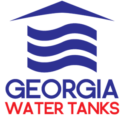Rainwater Filtration
FINAL FILTRATION
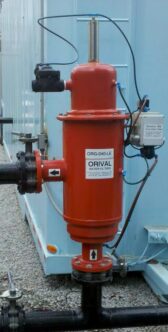
Orival Self-Cleaning Sediment Filters
We have tried bag filters and all the other self-cleaning sediment filters out there, and LOVE the Orival OR-G. Why?
It's self-cleaning. While changing bag filters isn't as nasty for rainwater harvesting skids as it would be for gray water, it's a maintenance item and someone has to monitor it and do it every few months.
It's available in sizes as small as 1½". Most of our treatment is 8-20 gpm, so anything larger is not only wasting money, but harder to backwash.
Backwashing flow rate is lower than other manufacturers, while still effective.
This from the manufacturer:
Automatic, self-cleaning, line pressure powered water filter. Units can be installed in parallel to handle larger flow rates. Fine screens available down to 10 microns in a variety of constructions, including standard stainless steel mesh, multi-layer sintered stainless steel and wedgewire. High efficiency rinse cycle consumes a fraction of the water of standard filters.
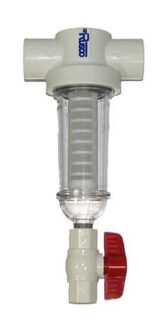
Rusco Spin-Down Water Filters
Rusco Spin-Down Sediment Filters are highly flexible filters designed to be utilized in a wide variety of applications. From household well water systems, geothermal heating, or lawn and turf, all the way to factories, livestock feeding systems, or advanced liquid cooling systems, Rusco's Spin-Down® has been providing the industry leading sediment filtration solution since 1977.
Uses include:
- Landscaping
- Drinking Water
- Agriculture
- Greenhouses
- Drip Irrigation
- Reclaimed Water
Georgia Water Tanks stocks the 1" poly screen and 2" stainless screen filters. Brochure Request a quote
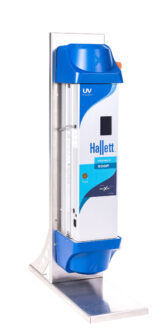
UV Pure Sterilizers
UV Pure® Technologies is a manufacturer of advanced ultraviolet water disinfection systems for residential, commercial, industrial, public and municipal applications in communities, buildings, and facilities worldwide. All UV Pure systems feature patented Crossfire Technology for effective disinfection of even the most difficult water.
Georgia Water Tanks features the Hallett products, which are proven for use in potable, wastewater, reuse, and rainwater disinfection systems for flows of up to 1 million gallons per day. UV Pure Hallet products are available with NSF 55 certification. NSF 55 certifies the performance of UV to sterilize viruses, cysts, mold and bacteria. You can read more about it here.
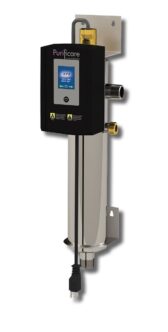
ATS UV Sterilizers
ATS manufacturers (in the USA!) water treatment from standalone UV sterilizers that compete with the Chinese imports, up to Log 4 water treatment and completely custom treatment skids. We use the SMKB treatment skids (with a carbon filter upstream to remove organic carbon) to treat rainwater to potable in commercial buildings. It also treats municipal water to the WELL building standard.
Application Model Brochure
Residential UV Treatment, 8 - 20 GPM, 99.9% bacteria reduction PFC Click here
Commercial UV Treatment, 40mJ/cm2, NSF 55 Class A, 40-700 GPM ASV Click here
Commercial UV Treatment, 186Mj/cm2, third-party tested 99.99% reduction, 10-480 GPM 186K Click here
Commercial Log4 Treatment Skid, 99.99% reduction of viruses, bacteria, and cysts SMKB Click here
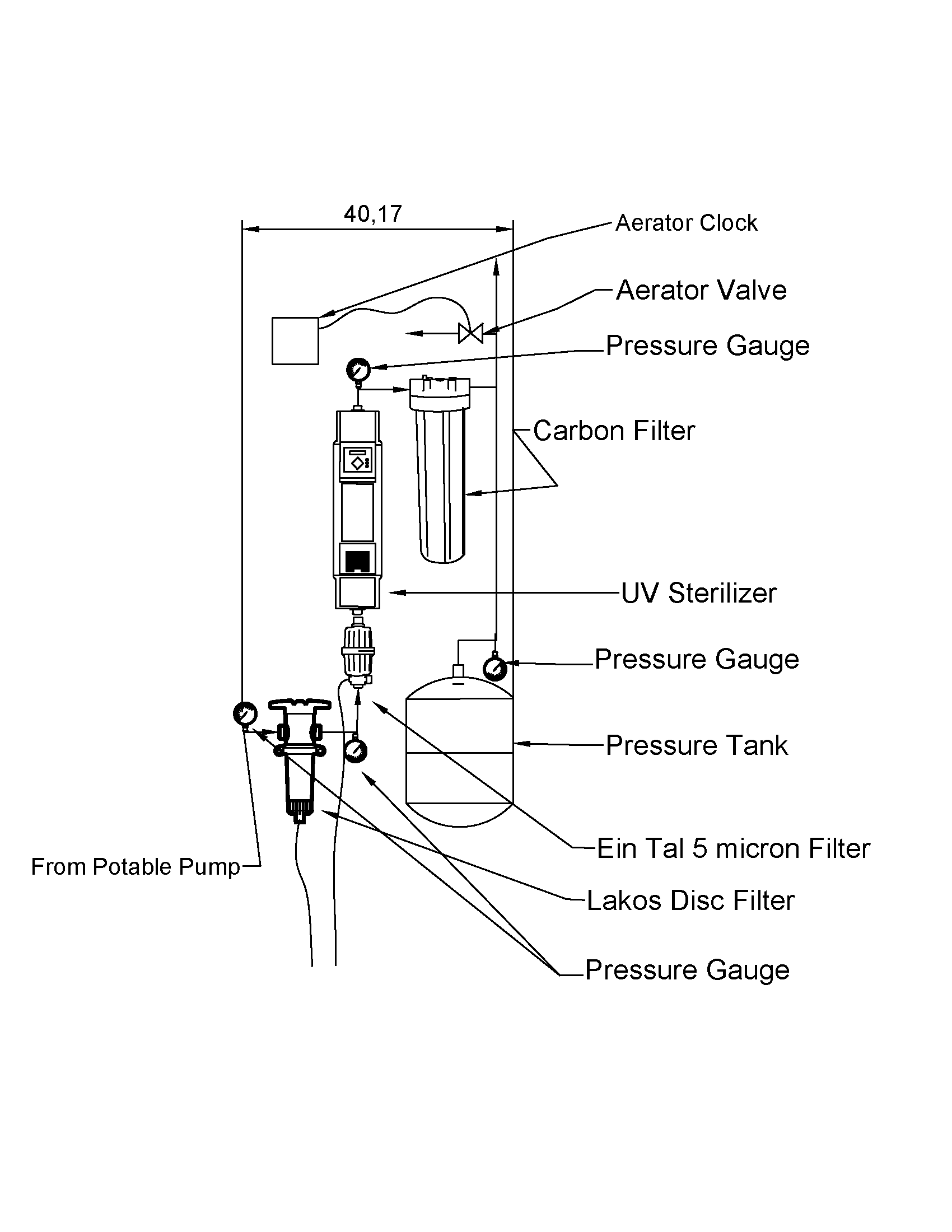
Residential Rainwater Treatment Systems
Georgia Water Tanks assembles complete treatment racks, with the components listed above, plus carbon and sediment as required. All models meet the City of Atlanta plumbing code for rainwater-to-potable treatment. We now offer various price points for our customers.
The two methods of water treatment are carbon and UV. Carbon chemically bonds to organic compounds, and therefore removes them from the water. More information can be found here. UV sterilizes living bacteria and viruses, so that they can't reproduce. The sediment filters clear up the water so that the UV is effective. Carbon filters are also effective sediment filters, and our lower-cost models use this method. Our high-end models include a separate filter, to prolong the effectiveness of the carbon stage.
There's a lot of misinformation about water treatment. Many of the products are not certified, and that's fine. Certification by NSF especially, is time-consuming and expensive. Note that NSF writes the standards, but other companies are also test and certify to the standards. Note that a couple of NSF certifications do NOT apply to water quality improvement, at least as it pertains to rainwater
NSF 61 is a certification that the wetted materials do not harm the water inside the product. IT IS NOT A CERTIFICATION OF WATER TREATMENT. And any company bragging about their filters being NSF 61 certified is trying to mislead you! Information here.
NSF 42 is a certification of effectiveness in reducing chlorine in the water. While this might be a good measure of performance vs. other organic compounds, we don't have chlorine in rainwater. More information is here.
Information about the NSF 55 standard for UV treatment of bacteria & viruses is here.
Information about the NSF 53 standard for carbon treatment of radon, asbestos, Cryptosporidium oocysts, and inorganic volatile chemicals, among numerous other contaminants, is here.
Gold | Silver | Bronze | Lite | |
|---|---|---|---|---|
Self-Cleaning Coarse Sediment Filter | ||||
Sediment Trapper - Requires Less Frequent Flushing | No | No | ||
Self-Cleaning Fine Sediment Filter, to reduce the sediment load on the carbon filter, and provide fine filtration as required for the UV sterilizer | No | No | ||
Carbon filter to remove contaminants commonly found in rainwater, such as cysts and microplastics | ||||
NSF 53 Carbon Filter | No | No | ||
UV Sterilizer | ||||
NSF 55 UV | No | No | No | |
UV intensity meter to verify UV operation | No | |||
Gauges to assist operator in knowing when to flush sediment filters. | No | |||
Water meter to assist operator in knowing when to change carbon filter. | No | No |
Ready to Buy?
Some products found on this page are available at our Amazon Store and our Ebay Store.

